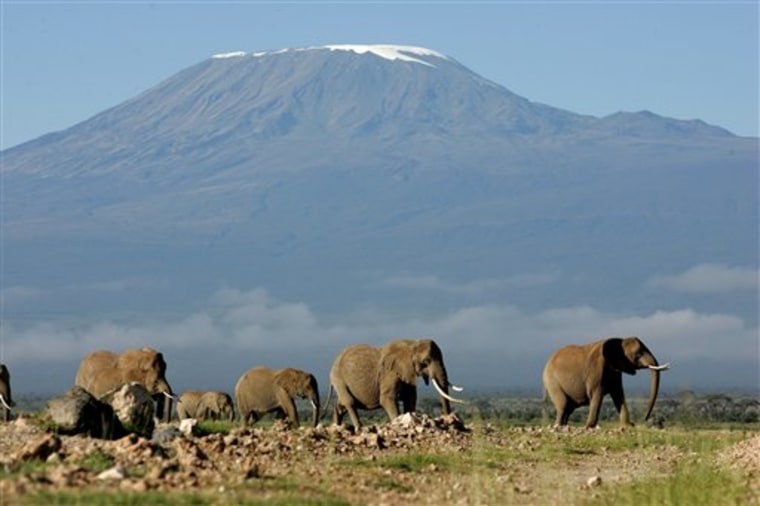Global warming isn't just a matter of melting icebergs and polar bears chasing after them. It's also Lake Chad drying up, the glaciers of Mt. Kilimanjaro disappearing, increasing extreme weather, conflict and hungry people throughout Africa.
According to a landmark effort to assess the risks of global warming, Africa, by far the lowest emitter of greenhouse gases in the world, is projected to be among the regions hardest hit by environmental change.
"We never used to have malaria in the highlands where I'm from, now we do," said Kenyan lawmaker Mwancha Okioma, at a recent briefing on climate change at the Pan African Parliament.
The new environmental committee, headed by Okioma, raised concerns about the severity of climate change on Africa and called for those responsible to help reduce its effects.
"Planes used to take people through Kilimanjaro to see the snows, now it's only at the very top. We are asking the ones in North America and Europe who are producing the pollution to help us," Okioma said.
By reviewing four years of research on projected climate change in Africa, scientists with the U.N. Intergovernmental Panel on Climate Change got a nuanced view of possible scenarios and assessed how these scenarios could play themselves out in a continent already stressed — water and food insecurity, infectious diseases, conflict, poverty.
"There's a whole suite of indicators which with climate change would undoubtedly make Africa one of the most stressed regions," said Coleen Vogel, an environmental expert at South Africa's University of Witwatersrand and lead author of a chapter on Africa being released earlier this month by the Intergovernmental Panel.
What 2050 might look like
An orbiting satellite over Africa in 2050 might see, according to the scientists' models, a drier north-northwest and south-southwest and wetter eastern and central regions.
"You have to temper these statements with a lot of caution," Vogel said. "But in general, those would be the patches that stand out."
If that satellite were to zoom in, the picture would be enormously more complex, influenced by a number of feedbacks — cascading effects. The scientists speak of possibilities, not certainties.
The greatest possible risks of climate change in Africa include rising sea-levels, droughts, famine, floods, the spread of diseases, loss of species, increased conflict, and more extreme weather.
"Temperature increases (of up to 6 degrees Celsius) will lead to massive ecological disruption, vast changes in water availability and probably devastating effects on agriculture," said Peter Glieck, president of the Pacific Institute in Oakland, who reviewed the report's water section.
Many plant species could die. Others will migrate, but can only go so far — either up a mountain or into the ocean toward the cooler, but still warming, higher latitudes in both northern and southern Africa. Animals will likely follow that path.
"Basically, they're trying to track their optimum climate," said Guy Midgely from the South African National Biodiversity Institute and a coordinating lead author for a chapter on ecosystems in the Intergovernmental Panel report. "It's what we call the fingerprint of climate change."
Rising seas and refugees
Globally, sea levels are projected to possibly rise three feet by the end of the 21st century. Three of the five coastal areas in the world projected to be most at risk of flooding are in Africa.
In addition, as temperatures rise and enlarge already arid regions, resources were likely to decrease — and human conflict could increase.
"We're already seeing growing conflicts over water resources in Africa and I am worried those conflicts are going to get worse. The Darfur situation has a water component. Definitely a resource component," Glieck said.
Climate refugees — people responding to long and short-term climate changes — also pose a risk.
"You'd tend to see more extremes," said Kathleen Miller of the National Center for Atmospheric Research and an author of the report's section on water resources and management. Rainstorms will tend to be harder, flash floods more likely. Africa already has plenty of refugees, any additional stress could make things worse, Miller said.
Certainly, the greatest risks are unpredictable disasters like storm surges, flash floods, and tropical cyclones.
Nearly two decades ago, in "The End of Nature," Bill McKibben likened the new human-altered climate we face to a messy divorce, where the husband comes back drunk and waving a gun. "The salient characteristic of this new nature is its unpredictability," he said.
Whose obligation?
The humans responsible are, for the most part, not African. Some say that puts the burden on the industrialized world to act to save everyone.
"The north has a moral obligation to reduce the extent of global warming through appropriate mitigation," Miller said.
"By far the largest emitters are outside of Africa ... and will have to bear the greatest cost of reducing emissions," Glieck said.
Because greenhouse-gas levels in the atmosphere are already high, steps taken now won't have results until 2050, scientists estimate.
"We've got to start now and reap the benefit in the second half of the century," said Dr. Bruce Hewitson, a coordinating lead author for the report's regional projections chapter. "If we don't ... it just makes the second half of the century that much worse."
This isn't to cast Africa as a continent of victims, though. Africans can move toward solar energy, hydroelectric power, protect forests, put carbon scrubbers on existing smokestacks and take other steps to adapt, mitigate the effects of warming, and even set an example for the world.
"Why should Africa sit with coal technology, which has created pollution ... why not a green path," said Midgely. "I think, let's get the whole world onto a greener development path, because when you create those green energy markets, the whole thing starts to snowball."
